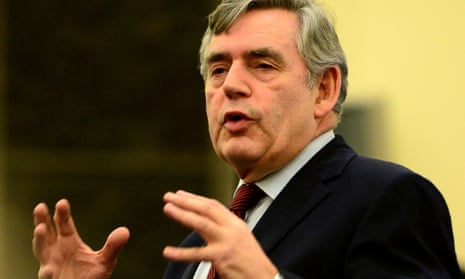Former UK prime minister Gordon Brown has urged countries to invest in infrastructure to boost the global economy in an address to world leaders at the World Economic Forum in Davos.
Brown said low interest rates and a range of recent global initiatives are among factors making this an ideal time to get infrastructure projects under way.
He said: “There’s big momentum now at a time, as I keep saying, when interest rates are low. This may be the best time in our history to do this. And the need in America and Europe as well as emerging markets is obvious.”
Initiatives created last year to support infrastructure projects, Brown said, include the G20 Global Infrastructure Initiative – a programme to support public and private investment in quality infrastructure – as well as “a number of project preparation facilities from the Regional Development Bank, the big Asian initiative, the Brics initiative, and a World Bank initiative to try to provide public finance, and if not finance, public guarantees and public expertise, to help get the projects moving”.
Brown also spoke of the benefits of public-private partnerships, which were pioneered in Britain. He said such partnerships can help pay for some of the preparation costs, which can be as high as 10% of some projects’ total costs. He added: “We need to do more to underpin the debt credit that has to be issued to get these projects under way.”
Last September, the International Monetary Fund said a 30-year decline in infrastructure spending needed to be reversed in order to boost global growth. The IMF has been a keen supporter of infrastructure investment since the financial crash as a way to boost employment and increase productivity. Better roads and rail, digital infrastructure and power networks support local businesses and help them increase output at lower costs.
Brown told delegates at the Davos meeting that any risks that made people feel that a project was too difficult to contemplate should be broken down into separate specific problems. He also called for countries to be benchmarked on their infrastructure projects.
“The WEF, which benchmarks competitiveness, ought to benchmark the efficiency of countries in dealing with infrastructure and the setting-up of partnerships,” he said. “But if you can break down problems into specific issues that have to be addressed then you can solve those problems and get projects under way.”
Brown was prime minister of the UK from 2007 until 2010, after serving as chancellor for 10 years. He is also chair of the WEF Global Strategic Infrastructure Initiative.
Sign up for your free weekly Guardian Public Leaders newsletter with news and analysis sent direct to you every Thursday. Follow us on Twitter via @Guardianpublic
